Populist Wins Landslide In Mexican Presidential Race
Andrés Manuel López Obrador, a populist from the left, rode a wave of populism and public disdain for the outgoing President to a landslide win in Mexico
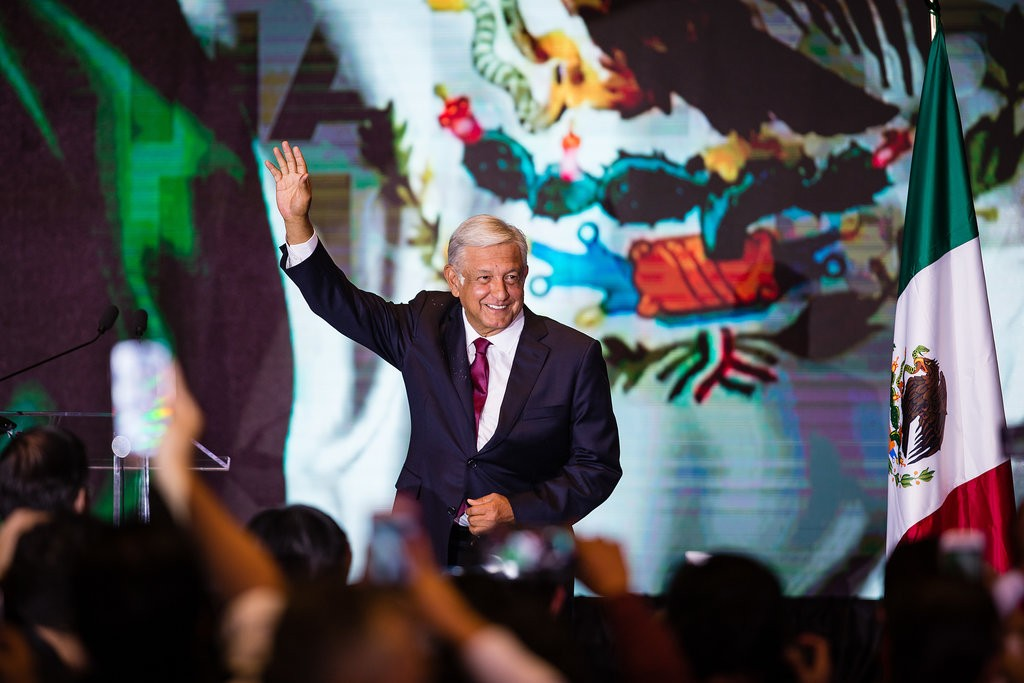
Andrés Manuel López Obrador, populist who campaigned from the left against a ruling popular that had become exceedingly unpopular, won election as Mexico’s 58th President in a landslide yesterday:
MEXICO CITY — Riding a wave of populist anger fueled by rampant corruption and violence, the leftist Andrés Manuel López Obrador was elected president of Mexico on Sunday, in a landslide victory that upended the nation’s political establishment and handed him a sweeping mandate to reshape the country.
Mr. López Obrador’s victory puts a leftist leader at the helm of Latin America’s second-largest economy for the first time in decades, a prospect that has filled millions of Mexicans with hope — and the nation’s elites with trepidation.
The outcome represents a clear rejection of the status quo in the nation, which for the last quarter century has been defined by a centrist vision and an embrace of globalization that many Mexicans feel has not served them.
The core promises of Mr. López Obrador’s campaign — to end corruption, reduce violence and address Mexico’s endemic poverty — were immensely popular with voters, but they come with questions he and his new government may struggle to answer.
How he will pay for his ambitious slate of social programs without overspending and harming the economy? How will he rid the government of bad actors when some of those same people were a part of his campaign? Can he make a dent in the unyielding violence of the drug war, which left Mexico with more homicides last year than any time in the last two decades?
And how will Mr. López Obrador, a firebrand with a tendency to dismiss his critics in the media and elsewhere, govern?
In the end, the nation’s desire for change outweighed any of the misgivings the candidate inspired.
“It is time for a change, it’s time to go with López Obrador, and see what happens,” said Juan de Dios Rodríguez, 70, a farmer in the state of Hidalgo, a longtime bastion of the governing Institutional Revolutionary Party, or PRI, which has dominated politics in Mexico for nearly his entire life. “This will be my first time voting for a different party.”
In his third bid for the presidency, Mr. López Obrador, 64, won in what authorities called the largest election in Mexican history, with some 3,400 federal, state and local races contested in all.
He won by capturing more than half the vote, according to early returns, more than any candidate since the nation began its transition to democracy nearly 20 years ago. In a reflection of the lopsided vote, his main competitors conceded the race within 45 minutes of the polls’ closing, another historical first.
With his coalition partners, it is likely that he will hold a majority in Congress, potentially giving him more power to enact his policies.
In his acceptance speech Sunday night in Mexico City, Mr. López Obrador sought to unite an electorate polarized over his election, and promised to look out for all citizens — with the poor being first among them.
“I call on all Mexicans to reconciliation, and to put above their personal interests, however legitimate, the greater interest, the general interest,” he said. “The state will cease to be a committee at the service of a minority and will represent all Mexicans, rich and poor, those who live in the country and in the city, migrants, believers and nonbelievers, to people of all philosophies and sexual preferences.”
A global repudiation of the establishment has brought populist leaders to power in the United States and Europe, and conservative ones to several countries in Latin America, including Colombia after an election last month.
“The recent elections in Latin America have exhibited the same demand for change,” said Laura Chinchilla, the former president of Costa Rica. “The results are not endorsements of ideologies, but rather demands for change, a fatigue felt by people waiting for answers that simply have not arrived.”
Mr. López Obrador, who vowed to cut his own salary and raise those of the lowest paid government workers, campaigned on a narrative of social change, including increased pensions for the elderly, educational grants for Mexico’s youth and additional support for farmers.
(…)
Even as the electoral rage propelling Mr. López Obrador’s rise is largely the result of domestic issues, there will be pressure for the new president to take a less conciliatory line with his American counterpart. Mexico’s current government, led by President Enrique Peña Nieto, has suffered a string of humiliations at the hands of Mr. Trump with relative silence.
But Mr. López Obrador is not the typical Latin American populist, nor does his branding as a leftist convey the complexity of his ethos.
In building his third candidacy for the presidency, he cobbled together an odd group of allies, some with contradictory visions. There are leftists, unions, far-right conservatives and support from religious groups. How he will manage these competing interests remains to be seen.
Even as the electoral rage propelling Mr. López Obrador’s rise is largely the result of domestic issues, there will be pressure for the new president to take a less conciliatory line with his American counterpart. Mexico’s current government, led by President Enrique Peña Nieto, has suffered a string of humiliations at the hands of Mr. Trump with relative silence.
But Mr. López Obrador is not the typical Latin American populist, nor does his branding as a leftist convey the complexity of his ethos.
In building his third candidacy for the presidency, he cobbled together an odd group of allies, some with contradictory visions. There are leftists, unions, far-right conservatives and support from religious groups. How he will manage these competing interests remains to be seen.
More from The Washington Post:
MEXICO CITY — Andrés Manuel López Obrador, who rallied voters with his battle cry against corruption and with his promises to the poor, won a resounding victory Sunday night in Mexico’s presidential election, after the concession of his two top rivals. The victory makes him the first leftist president since Mexico began its transition to multiparty democracy more than 30 years ago.
López Obrador triumphed with a party that did not exist at the time of the last election, against opponents from two parties that have ruled Mexico for nearly a century. The 64-year-old former mayor of Mexico City promises to bring his humble lifestyle and distaste for luxury to the top of a political establishment famous for self-enrichment.
An official “quick count” from a national sampling of ballots forecast that López Obrador would win with between 53 percent and 53.8 percent of the vote, according to the national electoral agency. That put him far ahead of his main opponents, Ricardo Anaya and José Antonio Meade, who conceded and offered their congratulations.
In his victory speeches, López Obrador called on Mexicans to reconcile and said his government would not be a “committee in service to a minority” but would represent all citizens rich and poor, religious or nonbelievers, migrants, “human beings of all manner of thought and all sexual preferences.”
“We will respect everyone,” he said at a downtown hotel. “But we will give preference to the most humble and forgotten.”
López Obrador’s supporters gathered by the thousands Sunday night in the Zocalo, Mexico City’s main plaza, chanting the president-elect’s name as mariachis performed. After López Obrador arrived, under a shower of confetti, he promised to increase subsidies to the elderly and handicapped.
“I want to go down in history as a good president of Mexico,” he said.
But many Mexicans were dubious.
“There is so much wrong. I think some people voted for López Obrador, but the majority voted for a change that we need,” said Fernando Torres, a 23-year-old publicity agent who was walking on Paseo de la Reforma, a major downtown boulevard.
López Obrador’s victory represents an emphatic rejection of the traditional politicians whom he regularly calls the “mafia of power.” In recent decades, Mexico has been led by technocrats and pro-American politicians, while López Obrador’s role models are Mexican independence and revolutionary leaders who stood up to more powerful foreign countries.
President Trump loomed in the background of this vote. He was not a wedge issue in the election — all candidates opposed his immigration and trade policies and his anti-Mexican rhetoric — but the new Mexican president will have to manage cross-border relations that are unusually fraught.
“There is so much wrong. I think some people voted for López Obrador, but the majority voted for a change that we need,” said Fernando Torres, a 23-year-old publicity agent who was walking on Paseo de la Reforma, a major downtown boulevard.
López Obrador’s victory represents an emphatic rejection of the traditional politicians whom he regularly calls the “mafia of power.” In recent decades, Mexico has been led by technocrats and pro-American politicians, while López Obrador’s role models are Mexican independence and revolutionary leaders who stood up to more powerful foreign countries.
President Trump loomed in the background of this vote. He was not a wedge issue in the election — all candidates opposed his immigration and trade policies and his anti-Mexican rhetoric — but the new Mexican president will have to manage cross-border relations that are unusually fraught.
Héctor Vasconcelos, who has been floated as a possible foreign minister, said in an interview: “We are very conscious of the enormity of the challenge. But someone has to try to turn this country toward profound change.”
López Obrador’s supporters attributed his victory to the longevity and personal charisma of a candidate who was running in his third consecutive presidential election and has campaigned in every municipality in the country. His message has remained largely consistent — eradicate corruption, invest in the poor, fight inequality — but it got a warmer reception this year because of mounting frustration after a series of scandals in Peña Nieto’s administration and ever-growing drug-war violence.
“Voting is the only tool we have to ensure that this corrupt system changes,” said Luis Valdepeña Bastida, 51, who voted for López Obrador in Ecatepec, a densely populated city north of the capital that has high levels of crime. “The people are fed up.”
López Obrador grew up in a middle-class family in the state of Tabasco on the Gulf of Mexico and began his political career helping indigenous villagers with public works projects, which exposed him to Mexico’s glaring inequality. He broke away from the PRI in the late 1980s and joined a leftist opposition party. López Obrador gained renown as a leader of protests against voter fraud and the abuses of the state-owned oil industry.
(…)
López Obrador’s critics warn that he will be more combative toward the United States than the current president, and that the U.S.-Mexico conflict could drastically escalate if he chooses to fight with Trump. In prior years, López Obrador was a critic of the North American Free Trade Agreement, or NAFTA, but he and his team have insisted they want to preserve it and maintain good relations with Trump.
Trump has regularly attacked Mexico for not doing enough to stop drugs, crime and undocumented immigrants from entering the United States. He has also initiated a renegotiation of NAFTA, saying Mexico has stolen U.S. jobs, and intends to build a border wall.
López Obrador, who heads the National Regeneration Movement, or Morena, says he plans to cut government personnel and salaries and prevent funds from being squandered through corruption. He intends to use those resources to boost social programs for the poor. Corruption experts express skepticism about whether this plan is realistic.
Alfonso Romo, a wealthy businessman who has been chosen as López Obrador’s chief of staff, told reporters last week that the economic team had met with hundreds of hedge funds and institutional investors as it became increasingly clear he would win.
“Up to now the markets are tranquil,” Romo said, referring to the currency, bond and stock prices. “What does that say? They have believed our plan.”
Sunday’s elections were the largest in Mexico’s history, with voters filling more than 3,200 positions at all levels of government. Among these were 628 members of the National Congress who will be able to be reelected for the first time in nearly a century, eight state governors and mayors of more than 1,500 cities, including Mexico City.
While Mexico’s relationship with the United States and the negative feelings toward the American President that have risen in the nation since Donald Trump became President, no doubt played a role in yesterday’s election, it’s clear that the primary motivation for López Obrador’s win yesterday clearly seems to be domestic. The incumbent President, Enrique Peña Nieto, had become exceedingly unpopular as his term dragged on due largely to the state of the Mexican economy, the continued violence associated with drug gangs and the kidnappings and murders that they have been responsible for, and the fact that Peña Nieto has done little to address the rampant corruption in government at the Federal, state, or local level. As a result, even though he was ineligible to run for re-election due to the terms of the Mexican Constitution, the failings of the past six years of his Presidency appear to have played a large role in the outcome of yesterday’s elections. Because of that, it seems likely that there will be significant pressure on López Obrador to deliver on his promises in coming years, and that failure to do so could end up bringing him to the same fate that Peña Nieto and his supporters have suffered.
While President Trump and his policy and rhetoric toward Mexico does not appear to have played a decisive role in the Mexican elections, it seems likely that his presence, and the issue of Mexico’s relationship with the United States. In addition to the derogatory comments about Mexicans that were a part of his first speech as a candidate for President, his demand for a border wall that Mexico would pay for, and the seemingly disastrous interactions he had with President Peña Nieto both as a candidate and as President, he quickly became exceedingly unpopular among the Mexican public and a frequent target of attack by Mexican citizens and Mexican politicians. For his own part, for example, López Obrador wrote a book whose title translates to “Listen, Trump: Proposals and Actions in Defense of Migrants in the U.S. Additionally, the campaign did include at least some discussion of the future of NAFTA, which is relevant in light of the fact that the American President has displayed open hostility toward that treaty notwithstanding its demonstrable success. That could have an impact on the status of future conversations about changes to the treaty that have been taking place between the United States, Canada, and Mexico over the course of the past year.
For his part, President Trump tweeted his congratulations to López Obrador last night:
Congratulations to Andres Manuel Lopez Obrador on becoming the next President of Mexico. I look very much forward to working with him. There is much to be done that will benefit both the United States and Mexico!
— Donald J. Trump (@realDonaldTrump) July 2, 2018
What all this means for the future of U.S.-Mexican relations, though, remains entirely unclear.

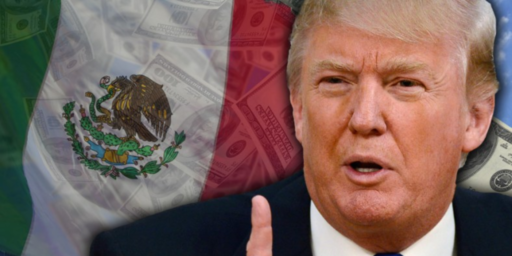
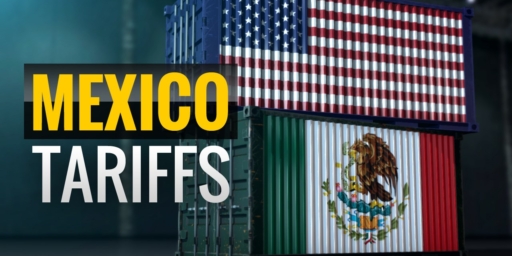
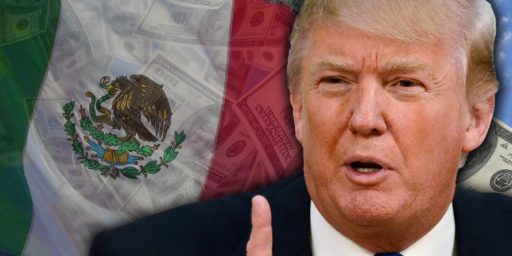
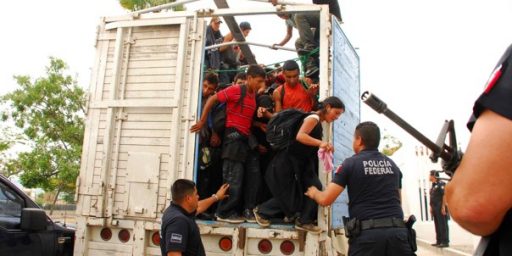
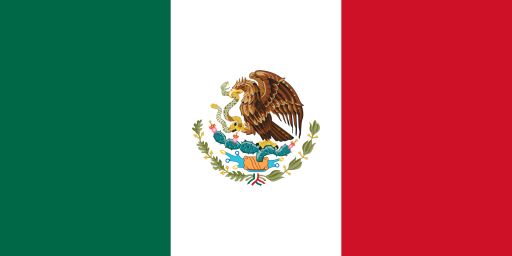
From The New Yorker story on this guy:
“We are going to lower the salaries of those who are on top to increase the salaries of those on the bottom,” he said, and added a Biblical assurance: “Everything I am saying will be done.”
At times, López Obrador ignored his assembly and governed by edict.
His campaign strategy seemed simple: make lots of promises and broker whatever alliances were necessary to get elected.
One resident recalled his giving speeches in “language that was reminiscent of the French Revolution.”
“Will he ruin Mexico?” Krauze asked. “No, but he could obstruct Mexico’s democracy by removing its counterweights. We’ve had a democratic experiment for the past eighteen years, ever since the pri first lost power, in 2000. It is imperfect, there is much to criticize, but there have also been positive changes. I’m worried that with amlo this experiment might end.”
There’s a lot more in the story. https://www.newyorker.com/magazine/2018/06/25/a-new-revolution-in-mexico
If the guy can do anything to help his country, that’ll be great for the U.S. as well. It’s fascinating, though, how someone like this is apparently okay for Mexico but not America, especially considering that Venezuela is RIGHT THERE.
Mike
Well, we’ve had two emperors (one imported!), assorted dictators and several presidents, we were overdue for a king.
BTW, while I’d have preferred literally anyone else win the election, this isn’t going to be as bad as many worry about.
For one thing, His Majesty is well qualified. He’s been in politics for a long time, and he was mayor of Mexico City from 2000 to 2005, with an Assembly dominated by his party. He did ok. He did not alienate everyone who voted against him. On campaign he’s an agitator and blowhard, but in power he governs responsibly and mostly plays by the rules.
He has three big failings: 1) he has to be the protagonist of everything, 2) he resorts to idiot conspiracy theories (not grand ones) when attacking policies he doesn’t like (including daylight savings time). 3)he becomes Donald Trump when he’s attacked (prior to Mangolini, I’d have said he goes apeshit crazy when attacked); if the attack has legal merit, watch out.
Hmm…those excerpts from that New Yorker story sound like they’re describing the Orange Toddler, of course, certain people are probably too dense to realize the similarities…
Oh wait, the two are nothing alike at all…
The election numbers are unusual.
His Majesty got around 53% of the vote. That makes him the first candidate to break 50% in a free election (Zedillo got 50.something in 1994, but I have doubts on that one). His nearest rival, Anaya, got 22.5%, which would have been a terrible performance for third place last election. This year’s third place, Meade, got only 16.24%
As late as last week I thought for the King to lose, one of the major candidates would have to withdraw (and of course none would). Well, that would have been an aggregate of 38.75% or so, which is really pitiful.
So, clearly the electorate is sick of the establishment, and they want a change.
Unfortunately His Majesty is as establishment was they come. He grew up int he PRI, left for the PRD when that became an option, and threw his own party together when the PRD split.
Both houses of Congress are also apparently shaping up to give Manuel Andres a majority, another unprecedented event since 2000. But keep in mind these come in a coalition of three parties, and I’ve no idea how cohesive they’ll prove once in power. and the same applies to the other two blocks as led by the PAN and PRI.
Interesting times.